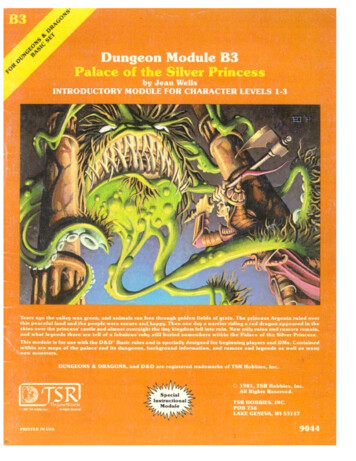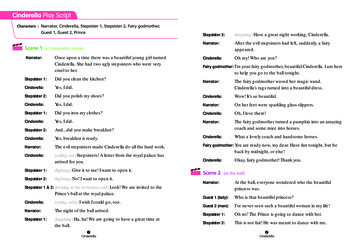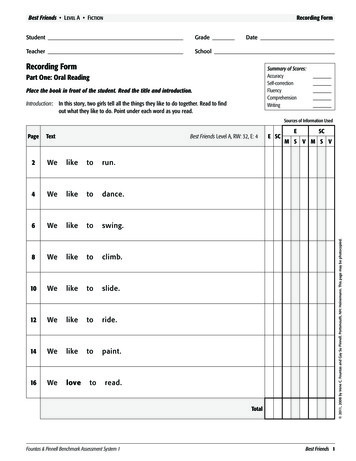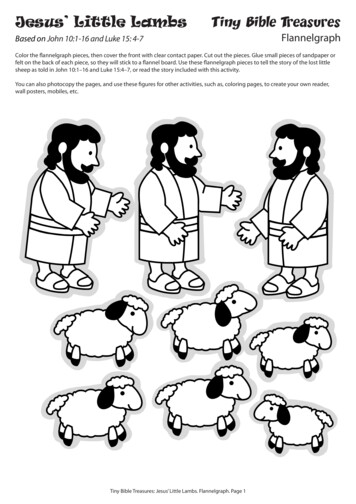
Transcription
A Little PrincessByFrances Hodgson Burnett1
CONTENTS1. Sara2. A French Lesson3. Ermengarde4. Lottie5. Becky6. The Diamond Mines7. The Diamond Mines Again8. In the Attic9. Melchisedec10. The Indian Gentleman11. Ram Dass12. The Other Side of the Wall13. One of the Populace14. What Melchisedec Heard and Saw15. The Magic16. The Visitor17. "It Is the Child"18. "I Tried Not to Be"19. Anne2
A Little Princess1SaraOnce on a dark winter's day, when the yellow fog hung so thick andheavy in the streets of London that the lamps were lighted and the shopwindows blazed with gas as they do at night, an odd-looking little girlsat in a cab with her father and was driven rather slowly through thebig thoroughfares.She sat with her feet tucked under her, and leaned against her father,who held her in his arm, as she stared out of the window at the passingpeople with a queer old-fashioned thoughtfulness in her big eyes.She was such a little girl that one did not expect to see such a lookon her small face. It would have been an old look for a child oftwelve, and Sara Crewe was only seven. The fact was, however, that shewas always dreaming and thinking odd things and could not herselfremember any time when she had not been thinking things about grown-uppeople and the world they belonged to. She felt as if she had lived along, long time.3
At this moment she was remembering the voyage she had just made fromBombay with her father, Captain Crewe. She was thinking of the bigship, of the Lascars passing silently to and fro on it, of the childrenplaying about on the hot deck, and of some young officers' wives whoused to try to make her talk to them and laugh at the things she said.Principally, she was thinking of what a queer thing it was that at onetime one was in India in the blazing sun, and then in the middle of theocean, and then driving in a strange vehicle through strange streetswhere the day was as dark as the night. She found this so puzzlingthat she moved closer to her father."Papa," she said in a low, mysterious little voice which was almost awhisper, "papa.""What is it, darling?" Captain Crewe answered, holding her closer andlooking down into her face. "What is Sara thinking of?""Is this the place?" Sara whispered, cuddling still closer to him. "Isit, papa?""Yes, little Sara, it is. We have reached it at last." And though shewas only seven years old, she knew that he felt sad when he said it.It seemed to her many years since he had begun to prepare her mind for"the place," as she always called it. Her mother had died when she was4
born, so she had never known or missed her. Her young, handsome, rich,petting father seemed to be the only relation she had in the world.They had always played together and been fond of each other. She onlyknew he was rich because she had heard people say so when they thoughtshe was not listening, and she had also heard them say that when shegrew up she would be rich, too. She did not know all that being richmeant. She had always lived in a beautiful bungalow, and had been usedto seeing many servants who made salaams to her and called her "MisseeSahib," and gave her her own way in everything. She had had toys andpets and an ayah who worshipped her, and she had gradually learned thatpeople who were rich had these things. That, however, was all she knewabout it.During her short life only one thing had troubled her, and that thingwas "the place" she was to be taken to some day. The climate of Indiawas very bad for children, and as soon as possible they were sent awayfrom it--generally to England and to school. She had seen otherchildren go away, and had heard their fathers and mothers talk aboutthe letters they received from them. She had known that she would beobliged to go also, and though sometimes her father's stories of thevoyage and the new country had attracted her, she had been troubled bythe thought that he could not stay with her."Couldn't you go to that place with me, papa?" she had asked when shewas five years old. "Couldn't you go to school, too? I would help youwith your lessons."5
"But you will not have to stay for a very long time, little Sara," hehad always said. "You will go to a nice house where there will be alot of little girls, and you will play together, and I will send youplenty of books, and you will grow so fast that it will seem scarcely ayear before you are big enough and clever enough to come back and takecare of papa."She had liked to think of that. To keep the house for her father; toride with him, and sit at the head of his table when he had dinnerparties; to talk to him and read his books--that would be what shewould like most in the world, and if one must go away to "the place" inEngland to attain it, she must make up her mind to go. She did not carevery much for other little girls, but if she had plenty of books shecould console herself. She liked books more than anything else, andwas, in fact, always inventing stories of beautiful things and tellingthem to herself. Sometimes she had told them to her father, and he hadliked them as much as she did."Well, papa," she said softly, "if we are here I suppose we must beresigned."He laughed at her old-fashioned speech and kissed her. He was reallynot at all resigned himself, though he knew he must keep that a secret.His quaint little Sara had been a great companion to him, and he felthe should be a lonely fellow when, on his return to India, he went into6
his bungalow knowing he need not expect to see the small figure in itswhite frock come forward to meet him. So he held her very closely inhis arms as the cab rolled into the big, dull square in which stood thehouse which was their destination.It was a big, dull, brick house, exactly like all the others in itsrow, but that on the front door there shone a brass plate on which wasengraved in black letters:MISS MINCHIN,Select Seminary for Young Ladies."Here we are, Sara," said Captain Crewe, making his voice sound ascheerful as possible. Then he lifted her out of the cab and theymounted the steps and rang the bell. Sara often thought afterward thatthe house was somehow exactly like Miss Minchin. It was respectableand well furnished, but everything in it was ugly; and the veryarmchairs seemed to have hard bones in them. In the hall everythingwas hard and polished--even the red cheeks of the moon face on the tallclock in the corner had a severe varnished look. The drawing room intowhich they were ushered was covered by a carpet with a square patternupon it, the chairs were square, and a heavy marble timepiece stoodupon the heavy marble mantel.7
As she sat down in one of the stiff mahogany chairs, Sara cast one ofher quick looks about her."I don't like it, papa," she said. "But then I dare say soldiers--evenbrave ones--don't really LIKE going into battle."Captain Crewe laughed outright at this. He was young and full of fun,and he never tired of hearing Sara's queer speeches."Oh, little Sara," he said. "What shall I do when I have no one to saysolemn things to me? No one else is as solemn as you are.""But why do solemn things make you laugh so?" inquired Sara."Because you are such fun when you say them," he answered, laughingstill more. And then suddenly he swept her into his arms and kissedher very hard, stopping laughing all at once and looking almost as iftears had come into his eyes.It was just then that Miss Minchin entered the room. She was very likeher house, Sara felt: tall and dull, and respectable and ugly. She hadlarge, cold, fishy eyes, and a large, cold, fishy smile. It spreaditself into a very large smile when she saw Sara and Captain Crewe.She had heard a great many desirable things of the young soldier fromthe lady who had recommended her school to him. Among other things, shehad heard that he was a rich father who was willing to spend a great8
deal of money on his little daughter."It will be a great privilege to have charge of such a beautiful andpromising child, Captain Crewe," she said, taking Sara's hand andstroking it. "Lady Meredith has told me of her unusual cleverness. Aclever child is a great treasure in an establishment like mine."Sara stood quietly, with her eyes fixed upon Miss Minchin's face. Shewas thinking something odd, as usual."Why does she say I am a beautiful child?" she was thinking. "I am notbeautiful at all. Colonel Grange's little girl, Isobel, is beautiful.She has dimples and rose-colored cheeks, and long hair the color ofgold. I have short black hair and green eyes; besides which, I am athin child and not fair in the least. I am one of the ugliest childrenI ever saw. She is beginning by telling a story."She was mistaken, however, in thinking she was an ugly child. She wasnot in the least like Isobel Grange, who had been the beauty of theregiment, but she had an odd charm of her own. She was a slim, supplecreature, rather tall for her age, and had an intense, attractivelittle face. Her hair was heavy and quite black and only curled at thetips; her eyes were greenish gray, it is true, but they were big,wonderful eyes with long, black lashes, and though she herself did notlike the color of them, many other people did. Still she was very firmin her belief that she was an ugly little girl, and she was not at all9
elated by Miss Minchin's flattery."I should be telling a story if I said she was beautiful," she thought;"and I should know I was telling a story. I believe I am as ugly asshe is--in my way. What did she say that for?"After she had known Miss Minchin longer she learned why she had saidit. She discovered that she said the same thing to each papa and mammawho brought a child to her school.Sara stood near her father and listened while he and Miss Minchintalked. She had been brought to the seminary because Lady Meredith'stwo little girls had been educated there, and Captain Crewe had a greatrespect for Lady Meredith's experience. Sara was to be what was knownas "a parlor boarder," and she was to enjoy even greater privilegesthan parlor boarders usually did. She was to have a pretty bedroom andsitting room of her own; she was to have a pony and a carriage, and amaid to take the place of the ayah who had been her nurse in India."I am not in the least anxious about her education," Captain Crewesaid, with his gay laugh, as he held Sara's hand and patted it. "Thedifficulty will be to keep her from learning too fast and too much.She is always sitting with her little nose burrowing into books. Shedoesn't read them, Miss Minchin; she gobbles them up as if she were alittle wolf instead of a little girl. She is always starving for newbooks to gobble, and she wants grown-up books--great, big, fat10
ones--French and German as well as English--history and biography andpoets, and all sorts of things. Drag her away from her books when shereads too much. Make her ride her pony in the Row or go out and buy anew doll. She ought to play more with dolls.""Papa," said Sara, "you see, if I went out and bought a new doll everyfew days I should have more than I could be fond of. Dolls ought to beintimate friends. Emily is going to be my intimate friend."Captain Crewe looked at Miss Minchin and Miss Minchin looked at CaptainCrewe."Who is Emily?" she inquired."Tell her, Sara," Captain Crewe said, smiling.Sara's green-gray eyes looked very solemn and quite soft as sheanswered."She is a doll I haven't got yet," she said. "She is a doll papa isgoing to buy for me. We are going out together to find her. I havecalled her Emily. She is going to be my friend when papa is gone. Iwant her to talk to about him."Miss Minchin's large, fishy smile became very flattering indeed.11
"What an original child!" she said. "What a darling little creature!""Yes," said Captain Crewe, drawing Sara close. "She is a darlinglittle creature. Take great care of her for me, Miss Minchin."Sara stayed with her father at his hotel for several days; in fact, sheremained with him until he sailed away again to India. They went outand visited many big shops together, and bought a great many things.They bought, indeed, a great many more things than Sara needed; butCaptain Crewe was a rash, innocent young man and wanted his little girlto have everything she admired and everything he admired himself, sobetween them they collected a wardrobe much too grand for a child ofseven. There were velvet dresses trimmed with costly furs, and lacedresses, and embroidered ones, and hats with great, soft ostrichfeathers, and ermine coats and muffs, and boxes of tiny gloves andhandkerchiefs and silk stockings in such abundant supplies that thepolite young women behind the counters whispered to each other that theodd little girl with the big, solemn eyes must be at least some foreignprincess--perhaps the little daughter of an Indian rajah.And at last they found Emily, but they went to a number of toy shopsand looked at a great many dolls before they discovered her."I want her to look as if she wasn't a doll really," Sara said. "Iwant her to look as if she LISTENS when I talk to her. The trouble withdolls, papa"--and she put her head on one side and reflected as she12
said it--"the trouble with dolls is that they never seem to HEAR." Sothey looked at big ones and little ones--at dolls with black eyes anddolls with blue--at dolls with brown curls and dolls with goldenbraids, dolls dressed and dolls undressed."You see," Sara said when they were examining one who had no clothes."If, when I find her, she has no frocks, we can take her to adressmaker and have her things made to fit. They will fit better ifthey are tried on."After a number of disappointments they decided to walk and look in atthe shop windows and let the cab follow them. They had passed two orthree places without even going in, when, as they were approaching ashop which was really not a very large one, Sara suddenly started andclutched her father's arm."Oh, papa!" she cried. "There is Emily!"A flush had risen to her face and there was an expression in hergreen-gray eyes as if she had just recognized someone she was intimatewith and fond of."She is actually waiting there for us!" she said. "Let us go in toher.""Dear me," said Captain Crewe, "I feel as if we ought to have someone13
to introduce us.""You must introduce me and I will introduce you," said Sara. "But Iknew her the minute I saw her--so perhaps she knew me, too."Perhaps she had known her. She had certainly a very intelligentexpression in her eyes when Sara took her in her arms. She was a largedoll, but not too large to carry about easily; she had naturallycurling golden-brown hair, which hung like a mantle about her, and hereyes were a deep, clear, gray-blue, with soft, thick eyelashes whichwere real eyelashes and not mere painted lines."Of course," said Sara, looking into her face as she held her on herknee, "of course papa, this is Emily."So Emily was bought and actually taken to a children's outfitter's shopand measured for a wardrobe as grand as Sara's own. She had lacefrocks, too, and velvet and muslin ones, and hats and coats andbeautiful lace-trimmed underclothes, and gloves and handkerchiefs andfurs."I should like her always to look as if she was a child with a goodmother," said Sara. "I'm her mother, though I am going to make acompanion of her."Captain Crewe would really have enjoyed the shopping tremendously, but14
that a sad thought kept tugging at his heart. This all meant that hewas going to be separated from his beloved, quaint little comrade.He got out of his bed in the middle of that night and went and stoodlooking down at Sara, who lay asleep with Emily in her arms. Her blackhair was spread out on the pillow and Emily's golden-brown hair mingledwith it, both of them had lace-ruffled nightgowns, and both had longeyelashes which lay and curled up on their cheeks. Emily looked so likea real child that Captain Crewe felt glad she was there. He drew a bigsigh and pulled his mustache with a boyish expression."Heigh-ho, little Sara!" he said to himself "I don't believe you knowhow much your daddy will miss you."The next day he took her to Miss Minchin's and left her there. He wasto sail away the next morning. He explained to Miss Minchin that hissolicitors, Messrs. Barrow & Skipworth, had charge of his affairs inEngland and would give her any advice she wanted, and that they wouldpay the bills she sent in for Sara's expenses. He would write to Saratwice a week, and she was to be given every pleasure she asked for."She is a sensible little thing, and she never wants anything it isn'tsafe to give her," he said.Then he went with Sara into her little sitting room and they bade eachother good-by. Sara sat on his knee and held the lapels of his coat in15
her small hands, and looked long and hard at his face."Are you learning me by heart, little Sara?" he said, stroking her hair."No," she answered. "I know you by heart. You are inside my heart."And they put their arms round each other and kissed as if they wouldnever let each other go.When the cab drove away from the door, Sara was sitting on the floor ofher sitting room, with her hands under her chin and her eyes followingit until it had turned the corner of the square. Emily was sitting byher, and she looked after it, too. When Miss Minchin sent her sister,Miss Amelia, to see what the child was doing, she found she could notopen the door."I have locked it," said a queer, polite little voice from inside. "Iwant to be quite by myself, if you please."Miss Amelia was fat and dumpy, and stood very much in awe of hersister. She was really the better-natured person of the two, but shenever disobeyed Miss Minchin. She went downstairs again, lookingalmost alarmed."I never saw such a funny, old-fashioned child, sister," she said. "Shehas locked herself in, and she is not making the least particle ofnoise."16
"It is much better than if she kicked and screamed, as some of themdo," Miss Minchin answered. "I expected that a child as much spoiledas she is would set the whole house in an uproar. If ever a child wasgiven her own way in everything, she is.""I've been opening her trunks and putting her things away," said MissAmelia. "I never saw anything like them--sable and ermine on hercoats, and real Valenciennes lace on her underclothing. You have seensome of her clothes. What DO you think of them?""I think they are perfectly ridiculous," replied Miss Minchin, sharply;"but they will look very well at the head of the line when we take theschoolchildren to church on Sunday. She has been provided for as if shewere a little princess."And upstairs in the locked room Sara and Emily sat on the floor andstared at the corner round which the cab had disappeared, while CaptainCrewe looked backward, waving and kissing his hand as if he could notbear to stop.17
2A French LessonWhen Sara entered the schoolroom the next morning everybody looked ather with wide, interested eyes. By that time every pupil--from LaviniaHerbert, who was nearly thirteen and felt quite grown up, to LottieLegh, who was only just four and the baby of the school--had heard agreat deal about her. They knew very certainly that she was MissMinchin's show pupil and was considered a credit to the establishment.One or two of them had even caught a glimpse of her French maid,Mariette, who had arrived the evening before. Lavinia had managed topass Sara's room when the door was open, and had seen Mariette openinga box which had arrived late from some shop."It was full of petticoats with lace frills on them--frills andfrills," she whispered to her friend Jessie as she bent over hergeography. "I saw her shaking them out. I heard Miss Minchin say toMiss Amelia that her clothes were so grand that they were ridiculousfor a child. My mamma says that children should be dressed simply. Shehas got one of those petticoats on now. I saw it when she sat down.""She has silk stockings on!" whispered Jessie, bending over hergeography also. "And what little feet! I never saw such little feet."18
"Oh," sniffed Lavinia, spitefully, "that is the way her slippers aremade. My mamma says that even big feet can be made to look small ifyou have a clever shoemaker. I don't think she is pretty at all. Hereyes are such a queer color.""She isn't pretty as other pretty people are," said Jessie, stealing aglance across the room; "but she makes you want to look at her again.She has tremendously long eyelashes, but her eyes are almost green."Sara was sitting quietly in her seat, waiting to be told what to do.She had been placed near Miss Minchin's desk. She was not abashed atall by the many pairs of eyes watching her. She was interested andlooked back quietly at the children who looked at her. She wonderedwhat they were thinking of, and if they liked Miss Minchin, and if theycared for their lessons, and if any of them had a papa at all like herown. She had had a long talk with Emily about her papa that morning."He is on the sea now, Emily," she had said. "We must be very greatfriends to each other and tell each other things. Emily, look at me.You have the nicest eyes I ever saw--but I wish you could speak."She was a child full of imaginings and whimsical thoughts, and one ofher fancies was that there would be a great deal of comfort in evenpretending that Emily was alive and really heard and understood. AfterMariette had dressed her in her dark-blue schoolroom frock and tied herhair with a dark-blue ribbon, she went to Emily, who sat in a chair of19
her own, and gave her a book."You can read that while I am downstairs," she said; and, seeingMariette looking at her curiously, she spoke to her with a seriouslittle face."What I believe about dolls," she said, "is that they can do thingsthey will not let us know about. Perhaps, really, Emily can read andtalk and walk, but she will only do it when people are out of the room.That is her secret. You see, if people knew that dolls could dothings, they would make them work. So, perhaps, they have promisedeach other to keep it a secret. If you stay in the room, Emily willjust sit there and stare; but if you go out, she will begin to read,perhaps, or go and look out of the window. Then if she heard either ofus coming, she would just run back and jump into her chair and pretendshe had been there all the time.""Comme elle est drole!" Mariette said to herself, and when she wentdownstairs she told the head housemaid about it. But she had alreadybegun to like this odd little girl who had such an intelligent smallface and such perfect manners. She had taken care of children beforewho were not so polite. Sara was a very fine little person, and had agentle, appreciative way of saying, "If you please, Mariette," "Thankyou, Mariette," which was very charming. Mariette told the headhousemaid that she thanked her as if she was thanking a lady.20
"Elle a l'air d'une princesse, cette petite," she said. Indeed, she wasvery much pleased with her new little mistress and liked her placegreatly.After Sara had sat in her seat in the schoolroom for a few minutes,being looked at by the pupils, Miss Minchin rapped in a dignifiedmanner upon her desk."Young ladies," she said, "I wish to introduce you to your newcompanion." All the little girls rose in their places, and Sara rosealso. "I shall expect you all to be very agreeable to Miss Crewe; shehas just come to us from a great distance--in fact, from India. As soonas lessons are over you must make each other's acquaintance."The pupils bowed ceremoniously, and Sara made a little curtsy, and thenthey sat down and looked at each other again."Sara," said Miss Minchin in her schoolroom manner, "come here to me."She had taken a book from the desk and was turning over its leaves.Sara went to her politely."As your papa has engaged a French maid for you," she began, "Iconclude that he wishes you to make a special study of the Frenchlanguage."21
Sara felt a little awkward."I think he engaged her," she said, "because he--he thought I wouldlike her, Miss Minchin.""I am afraid," said Miss Minchin, with a slightly sour smile, "that youhave been a very spoiled little girl and always imagine that things aredone because you like them. My impression is that your papa wished youto learn French."If Sara had been older or less punctilious about being quite polite topeople, she could have explained herself in a very few words. But, asit was, she felt a flush rising on her cheeks. Miss Minchin was a verysevere and imposing person, and she seemed so absolutely sure that Saraknew nothing whatever of French that she felt as if it would be almostrude to correct her. The truth was that Sara could not remember thetime when she had not seemed to know French. Her father had oftenspoken it to her when she had been a baby. Her mother had been a Frenchwoman, and Captain Crewe had loved her language, so it happened thatSara had always heard and been familiar with it."I--I have never really learned French, but--but--" she began, tryingshyly to make herself clear.One of Miss Minchin's chief secret annoyances was that she did notspeak French herself, and was desirous of concealing the irritating22
fact. She, therefore, had no intention of discussing the matter andlaying herself open to innocent questioning by a new little pupil."That is enough," she said with polite tartness. "If you have notlearned, you must begin at once. The French master, Monsieur Dufarge,will be here in a few minutes. Take this book and look at it until hearrives."Sara's cheeks felt warm. She went back to her seat and opened thebook. She looked at the first page with a grave face. She knew itwould be rude to smile, and she was very determined not to be rude. Butit was very odd to find herself expected to study a page which told herthat "le pere" meant "the father," and "la mere" meant "the mother."Miss Minchin glanced toward her scrutinizingly."You look rather cross, Sara," she said. "I am sorry you do not likethe idea of learning French.""I am very fond of it," answered Sara, thinking she would try again;"but--""You must not say 'but' when you are told to do things," said MissMinchin. "Look at your book again."And Sara did so, and did not smile, even when she found that "le fils"23
meant "the son," and "le frere" meant "the brother.""When Monsieur Dufarge comes," she thought, "I can make himunderstand."Monsieur Dufarge arrived very shortly afterward. He was a very nice,intelligent, middle-aged Frenchman, and he looked interested when hiseyes fell upon Sara trying politely to seem absorbed in her little bookof phrases."Is this a new pupil for me, madame?" he said to Miss Minchin. "I hopethat is my good fortune.""Her papa--Captain Crewe--is very anxious that she should begin thelanguage. But I am afraid she has a childish prejudice against it. Shedoes not seem to wish to learn," said Miss Minchin."I am sorry of that, mademoiselle," he said kindly to Sara. "Perhaps,when we begin to study together, I may show you that it is a charmingtongue."Little Sara rose in her seat. She was beginning to feel ratherdesperate, as if she were almost in disgrace. She looked up intoMonsieur Dufarge's face with her big, green-gray eyes, and they werequite innocently appealing. She knew that he would understand as soonas she spoke. She began to explain quite simply in pretty and fluent24
French. Madame had not understood. She had not learned Frenchexactly--not out of books--but her papa and other people had alwaysspoken it to her, and she had read it and written it as she had readand written English. Her papa loved it, and she loved it because hedid. Her dear mamma, who had died when she was born, had been French.She would be glad to learn anything monsieur would teach her, but whatshe had tried to explain to madame was that she already knew the wordsin this book--and she held out the little book of phrases.When she began to speak Miss Minchin started quite violently and satstaring at her over her eyeglasses, almost indignantly, until she hadfinished. Monsieur Dufarge began to smile, and his smile was one ofgreat pleasure. To hear this pretty childish voice speaking his ownlanguage so simply and charmingly made him feel almost as if he were inhis native land--which in dark, foggy days in London sometimes seemedworlds away. When she had finished, he took the phrase book from her,with a look almost affectionate. But he spoke to Miss Minchin."Ah, madame," he said, "there is not much I can teach her. She has notLEARNED French; she is French. Her accent is exquisite.""You ought to have told me," exclaimed Miss Minchin, much mortified,turning to Sara."I--I tried," said Sara. "I--I suppose I did not begin right."25
Miss Minchin knew she had tried, and that it had not been her faultthat she was not allowed to explain. And when she saw that the pupilshad been listening and that Lavinia and Jessie were giggling behindtheir French grammars, she felt infuriated."Silence, young ladies!" she said severely, rapping upon the desk."Silence at once!"And she began from that minute to feel rather a grudge against her showpupil.26
3ErmengardeOn that first morning, when Sara sat at Miss Minchin's side, aware thatthe whole schoolroom was devoting itself to observing her, she hadnoticed very soon one little girl, about her own age, who looked at hervery hard with a pair of light, rather dull, blue eyes. She was a fatchild who did not look as if she were in the least clever, but she hada good-naturedly pouting mouth. Her flaxen hair was braided in a tightpigtail, tied with a ribbon, and she had pulled this pigtail around herneck, and was biting the end of the ribbon, resting her elbows on thedesk, as she stared wonderingly at the new pupil. When MonsieurDufarge began to speak to Sara, she looked a little frightened; andwhen Sara stepped forward and, looking at him with the innocent,appealing eyes, answered him, without any warning, in French, the fatlittle girl gave a star
Bombay with her father, Captain Crewe. She was thinking of the big ship, of the Lascars passing silently to and fro on it, of the children playing about on the hot deck, and of some young officers' wives who used to try to make her talk to them and laugh at the things she said. Principally, she was t










